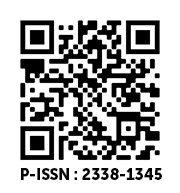Physicochemical and microbiological properties of Finger Millet and Defatted Sesame seeds flours used as complementary foods
DOI:
https://doi.org/10.36782/apjsafe.v12i2.359Keywords:
Complementary foods, Fermentation, Germination, Microbiological, MineralsAbstract
Finger millet and defatted sesame seeds were studied subject to germination and / or natural fermentation. Various kinds of treatment were given to the product which gave rise to non-germinated (NG) and non-fermented (NF) finger millet, germinated non-fermented (GN) and germinated fermented (GF) finger millet plus defatted sesame flour. Cerelac - commercial maize + soybean product was used as control with samples were formulated to provide 16g protein/100g solid based on their proximate composition using material balancing. Moisture content of complementary food ranged from 7.66- 8.13g/100g. Carbohydrate ranged from 63.92- 64.93g/100g with an equal increase in energy value from 368.04- 369.61kJ/100g. Also, the mineral content of complementary foods showed similar increase for calcium: 252.80- 281.10mg/100g, potassium: 946.35- 994.13mg/100g, iron: 4.87- 6.61mg/100g, zinc: 10.21- 11.45mg/100g with germination and fermentation. As expected, anti-nutritional factors reduced to acceptable values with oxalate ranging from 0.26- 1.96g/100g, tannins 0.44- 1.92g/100g, phytate 0.37- 2.31g/100g and cyanides 0.34-2.13g/100g. Total viable counts (cfu/g) ranged from 0.2×103 - 1.6×103 while there was no detection of E.coli in the samples.
Downloads
References
Abdelrahaman, S.M., Elmaki, H.B., Idris, W.H., Hassan, A.B., Babiker, E.E., E.l Tinay, A.H. 2007. Antinutritional factor content and hydrochloric acid extractability of minerals in pearl millet cultivars as affected by germination. Intl. J.Food sciences & Nutrition 58(1) : 6-17 Doi : 10. 1080/09637480601093236.
AU P.M., Fields M.L 2000. Note on nutritive quality of fermented sorghum. J. Food Sci.,46, 652-654.
ASAES Standards, 47th ed. 2017. D241.4: Density, specific gravity, and mass-moisture relationships for grain for storage. St. Joseph, Mich.: ASAE.
Babiker, A., Husseini, E.l. M., Nemri, A.l. A., Frayh A.l. A, Juryyan, A.l. N., Faki, M.O, Assiri, A., Saadi, A.l. M, Shaikh, F, Zamil, A.l. F.2014. Health care professional development: Working as a team to improve patient care. Sudan J Paediatr. 14(2):9-16. PMID: 27493399; PMCID: PMC4949805
Bailey K.D 2000. Social ecology and living system theory. Systems Research and Behavioral science/ vol.15,Doi:org/10.1002/(SCI).
Bolarinwa, F., Olanitan, S.A., Adabayo, L.O., Adamola, A.A. 2015.Malted sorghum –soybean composite flour. Preparation, chemical and physicochemical properties. Journal of Food Processing and Technology, 6(8) DOI: 10.4172/2157-7110.1000467
Barber, L.I., Obinna-Echem, P.C., Ogburia, E.M. 2017. Proximate Composition and Sensory Properties of Complementary Food Formulated from Malted Pre-Gelatinized Maize, Soybean and Carrot Flours. Sky journal of Food Science 6(3): 033-039.
Blackman, C.J., Gleason, S.M., Chang, Y., Cook, A.M., Laws C, Westoby, M. 2014. Leaf hydraulic vulnerability to drought is linked to site water availability across a broad range of species and climates. Ann Bot.114(3): 435-440. Doi:10.1093/aob/mcu131.
Devi, P.B., Vijayabharathi, R., Sathyabama, S., Malleshi, N.G., Priyadarisini, V.B. 2014. Health benefits of finger millet (Eleusine coracana L.) polyphenols and dietary fiber: a review. J Food Sci Technol. Jun;51(6):1021-40. doi: 10.1007/s13197-011-0584-9. Epub 2011 Nov 22. PMID: 24876635; PMCID: PMC4033754. -
Dewey, K. 2003. Guiding principles for complementary feeding of the breastfed child. Pan American Health Organization: World Health Organization. Food and nutrition program.
Egbujie, A.e., and Okoye, J.i. 2019. Chemical and sensory evaluation of complementary foods produced from sorghum, African yam bean and crayfish flours. Int. Journal of Food sciences and Nutrition.(4)114-119
Food and agricultural organisation stastical databases for united nations,Rome :international conference on nutrition,2014.
Food and agricultural organisation stastical databases for united nations, Rome: international conference on nutrition, 2022.
Gernah, D.I., Ariahu, C.C., and Ingbian, E.K. 2011. Effects of Malting and Lactic Fermentation on Some Chemical and Functional Properties of Maize (Zea mays) American Journal of Food Technology 6(5): 404-412.
Giami S.Y., Bekebain D.A.2016. Proximate composition and functional properties of raw and processed full fat fluted pumpkin Telferia occidentalis) seed flour. Journal of Food Sci and Agric., 59, 321-325
Gibson, G. 2019. Malting.In Cereals Processing Technology, edited by G. Owens. Cambridge, MA: Woodhead Publishing Limited.
Gopaldas, T., John, C, 1992. Evaluation of a controlled 6 months feeding trial on intake by infants and toddlers fed high energy low bulk versus a high energy –high bulk gruel in addition to their habitual home diet. I.J. Trop. Paediatric, 38 (6), 278-283
Ijarotimi, O.S., Bakare, S.S., 2006. Evaluation of proximate, mineral and anti-nutritional factor of homemade processed complementary diet from locally available food materials (Sorghum bicolor and Sphenostylis stenocarpa). Journal of Food Technology, 4(4): 339-344
Ishiwu, C.N., Onyeji, A.C. 2018. Properties of an instant gruel based of maize (zea mays L) starch, African yam bean (Sphenostylis stenocarpa) and Soybean (Glycine max) flours. Nigerian Journal of Nutrional Sciences.25:16-19.
Lewis, M., Young, T.W. 2001. Malting Technology: malt, specializes in malts, and non-malt adjuncts.In Brewing. New York;Kluwer Academic.
Marero, L., Payumo, E., Librando, E., Lainez, W., Gopez; Homma, S. Technology of Weaning 1998. Food Formulations Prepared from Germinated Cereals and Legumes. J. Food Sci. 53, 1391–1395, https://doi.org/10.1111/j.1365-2621.1988.tb09284.x.
Mariam, S. 2005. Nutritive value of three potential complementary foods based on cereal and legumes. African Journal of Food and Nutritional Sciences. 5(2) 1-14
Malomo, S.A., He, R., Aluko,. R.E. 2014. Structural and functional properties of hemp seed protein products. J Food Sci. Aug;79(8):C1512-21. doi: 10.1111/1750-3841.12537. Epub 2014 Jul 21. PMID: 25048774.
Mosha A.C., Lorri W.S.M. 2015. High nutrient density weaning foods from germinated cereals.in: Improving Young Child Feeding in Eastern and Southern Africa. Nairobi (rds. D.Alnwick, S.Moses, O.G. Schmidt). IDRC, UNICEF, SIDA, New York, Stockholm, pp.288-299.
Muthamilarasan, M., Dhaka, A., Yadav, R., Prasad, M. 2016. Exploration of millet models for developing nutrient rich graminaceous crops. Plant Science, 242, 89–97.
Ndife J., Abdulraheem L.O., Zakaria U.M., 2011
. Evaluation of the nutritional and sensory quality African Journal of Food Science. 59 :321-325.
Nzeagwu O.C., Nwaejike N.J., 2008. Nutrient composition, functional and organoleptic properties of complementary food formulated from sorghum, groundnut and crayfish. Nigeria Food Journal. 26 (1)13-20.
Onabanjo, O.O., Akinyemi, C.O. and Agbon, C.A. 2009. Characteristics of complementary foods produced from sorghum, sesame, carrot and crayfish flours. Journal of Nature Sciences, Engineering and Technology. 8(1): 71-83. –
Ochanda, S.O., Onyango, C. A., Mwasaru, A. M., Ochieng J. K., and Mathooko, F. M. 2010. Effects of malting and fermentation treatments on group B- vitamins of red sorghum, white sorghum and pearl millets in Kenya. J. Appl. Biosci., 34: 2128- 2134.
Oduro I., Ellis W.O., Sulemana A., Oti-Boateng, P. 2007. Breakfast meal from breadfruit and soybean composite flours. Discovery and Innovation. 19:238-242.
Okaka, J.C. 2019. Cereals and Legumes: Storage and processing technology. Data and Microsystems publishers Enugu, Nigeria. 5(6), 153-15
Olaofe O., Sanni C.O., 2014. Mineral content of grain and baby foods. J.Sci.Food Agric., 45, 191-194.
Omary Z., Lupiana D., Mtenzi F., Wu B. 2019. Challenges to E-Healthcare Adoption in Developing countries: A case study of Tanzania. First Intl conference on Networked Digital Technologies. Ostrava.
Oshodi, A.A., Ogungbenle, H.N., Oladimeji, M.O. 1999. Chemical composition, nutritionally valuable minerals and functional properties of benniseed (Sesamum radiatum), pearl millet (Pennisetum typhoides) and quinoa (Chenopodium quinoa) flours. Int J Food Sci Nutr. Sep;50(5):325-31. doi: 10.1080/096374899101058. PMID: 10719563
Pelto, G.H., Levit,t E., Thairu, L. 2003. Improving feeding practices: current patterns, common constraints, and the design of interventions. Food Nutr Bull. Mar;24(1):45-82. doi: 10.1177/156482650302400104. PMID: 12664527.
Pollock, J.R.A. 2000. The nature of the malting process in Barley and malt-Biology,Bioxtry,Technology , edited by A. H. cook. London: Academic press inc
Pradhan, A., Nag, S.K., and Patil, S.K. 2010. Dietary management of finger millet (Eleusine coracana L. Gaerth) controls diabetes.Curr.Sci. 98 (6),763-765
Velmurugu Ravindran., Blair, R 1991. Feed resources for poultry production in Asia and the pacific. II plant protein sources. 47(03):213-231 doi: 10.1079/WPS19920018.
Siwela, M., Taylor, J. N. R., de Milliano, W. A. J., & Doudu, K. G. 2010. Influence of phenolic in finger millet on grains and malt fungal load, and malt quality. Food Chemistry, 121(2), 443–449.
Sripriya, G., Usha, Antony., Chandra, T.S. 1997. Changes in carbohydrate, free amino acids, phytate and HCL extractability of minerals during germination and fermentation of finger millet (Eleusine coracana). Food Chemistry, 58 (4), 345–350.
Temple Elise. 2018. Comprehensive Food Science and Nutrition. Macmillan press, Ibadan, Nigeria, 224-228.
Yusufu, P.A., Egbunu, F.A., Egwujeh S., Opega, G.L., Adikwu, M. 2013. Evaluation of complementary food prepared from sorghum, African yam bean and mango mesocarp flour blends. Paskistan Journal of Nutrition. 12(2):205-208
Motarijemi, Y. 2002. Impact of small scale fermentation technology on food safety in developing countries. Int J Food Microbiol.25., 75(3), 213-29. doi: 10.1016/s0168-1605(01)00709-7. PMID: 12036144.
Zebib, H., Bultosa, G., Abera, S. 2015. Physicochemical properties of sesame (Sesamum indicum L.) varieties grown in northern area, Ethiopia. Agric. Sci. 6, 238-246. doi: 10.4236/as.2015.62024.
Zilić, S., Serpen, A., Akıllıoğlu, G., Gökmen, V., Vančetović, J. 2012. Phenolic compounds, carotenoids, anthocyanins, and antioxidant capacity of colored maize (Zea mays L.) kernels. J Agric Food Chem. Feb 8;60(5):1224-31. doi: 10.1021/jf204367z. Epub 2012 Jan 26. PMID: 22248075.








